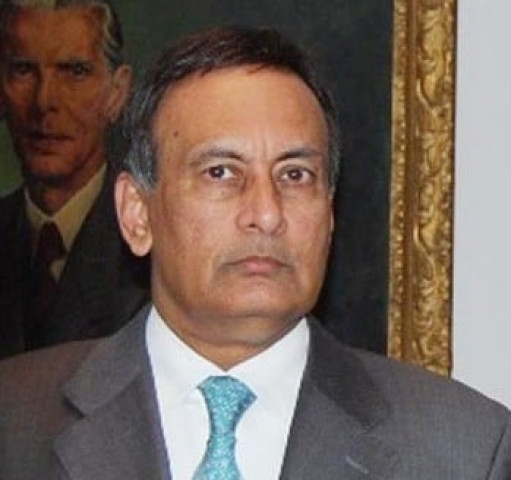Who is afraid of Husain Haqqani?
According to the critics, Husain Haqqani can’t be trusted because of his frequent shifts in political loyalty

According to the critics, Husain Haqqani can’t be trusted because of his frequent shifts in political loyalty. PHOTO: PID/ FILE
In a recent, much tweeted and re-tweeted article in The Express Tribune titled “The Magnificent Delusions of Husain Haqqani”, Asad Rahim Khan covered well-treaded ground: Haqqani was in student politics some 43 years ago, affiliated with the Islami Jamiat-e-Talaba (IJT); he praised General Ziaul Haq in the 1980s as a young journalist before working for Nawaz Sharif. He switched sides and became close to Benazir Bhutto and Asif Ali Zardari, ending up as Pakistan’s ambassador to the US after a stint in exile during the Musharraf years.
According to the critics, Haqqani can’t be trusted because of his frequent shifts in political loyalty. His academic critique of Pakistan’s state ideology, and defence and foreign policies must be ridiculed as that of an opportunist, who now works either for the Americans or the Indians, or possibly both. But the venom for Haqqani can’t solely be on account of changing political affiliations. One never sees any articles or blogs against other notable party switchers from Ghulam Mustafa Khar to Makhdoom Shah Mehmood Qureshi and the dozens who have been in every major political party there is in Pakistan. Nor is Haqqani’s student-era flirtation with the IJT followed by a transition to liberal politics extraordinary. Many political personalities — from former president Farooq Leghari to former PTI president Javed Hashmi — followed a similar route on campuses. They just grew up, as probably did Haqqani.
Mr Rahim regurgitates some stories that have only come into circulation since 1993, when after joining Benazir Bhutto, Haqqani began to develop a coherent argument against the military’s dominance of Pakistani politics. For example, there is the story of Haqqani being somehow responsible for the IJI’s “airdropping pamphlets of Begum Bhutto waltzing with Jerry Ford, to forging Benazir’s ‘letter’ to Peter Galbraith calling for American action”. Haqqani is supposed to have engaged in these evil deeds in 1988, but stories of these did not surface until 1993, when he appeared at Benazir Bhutto’s side. She somehow did not know about this or lied when she told the media she knew who was responsible for dirty tricks against her in 1988, and it was not Haqqani. In the acknowledgments of her book Reconciliation: Islam, Democracy, and the West, Benazir Bhutto described Haqqani as “a loyal friend” and a man whose advice to her was always sound. But why quote that when unsubstantiated and oft-denied rumours serve a propaganda purpose that cannot be served by giving context?
Like other ad hominem attacks on Haqqani, the latest article also uses selective quotes from his writings or others’ writings about him. Positive pieces about him, such as the 2009 New York Times profile “Adroit envoy states case for Pakistan” get no mention. Ardeshir Cowasjee’s column from 1999 about Pakistan’s spin doctors is partially quoted without including favourable references to Haqqani, especially the saga of his arrest and torture during the last months of Nawaz Sharif’s second stint as prime minister. Cowasjee praised Haqqani in December 2010 as someone who has “read and learned a lot since his birth in 1956”.
The Memogate drama continues to be invoked without reference to the fact that the Supreme Court has shelved the matter without a final judgment. Instead of charging Haqqani, former chief justice Iftikhar Chaudhry helped create the impression that Haqqani was somehow required to come before the Court even as he declared that Haqqani was neither an accused in a criminal case nor deemed guilty of any crime.
Mr Rahim also cites a Wall Street Journal article Haqqani wrote about his personal journey only to the extent of the former ambassador’s remarks about his interaction with General Zia. The same 1999 article also narrates Haqqani’s story about his childhood in “the lower income area where we lived in Karachi”. According to that account, Haqqani was introduced, as a 12-year-old, to political Islam by “an elderly accountant living in our lane”, who helped him address the lack of drainage in the street. Acknowledging Haqqani’s humble origins and the possibility that he changed his political views gradually as he was exposed to different ideas that were inaccessible to him in a lower income Karachi neighbourhood would take away from the ‘opportunist’ narrative that his critics wish to popularise about him.
In fact, the obsession with Haqqani is all about narratives. The former ambassador’s two books Pakistan Between Mosque and Military (2005) and Magnificent Delusions; Pakistan, the United states and an Epic History of Misunderstanding (2015) question the state narrative built over the decades by the country’s establishment. Haqqani’s recent comments and writings about Pakistan lagging behind India in almost all key indicators of national power (except nuclear weapons) and the need to develop alternative approaches to the Kashmir issue also run against conventional wisdom in Pakistan. Haqqani has articulated these views in Pakistan, too, but currently he is cited more frequently in the Indian and international media.
John Le Carre’s character George Smiley says in Tinker, Tailor, Soldier, Spy, “The fanatic is always concealing a secret doubt.” So, who is afraid of Husain Haqqani? All those who fear that their carefully crafted ideology will not withstand the scrutiny of a self-made former ambassador with a possibly flawed past but a strong, fact-based argument at present. The ferocity with which some people attack an ‘irrelevant’ man indicates the depth of their secret doubts about their professed patriotic certainties.
Published in The Express Tribune, October 4th, 2015.
Like Opinion & Editorial on Facebook, follow @ETOpEd on Twitter to receive all updates on all our daily pieces.














COMMENTS
Comments are moderated and generally will be posted if they are on-topic and not abusive.
For more information, please see our Comments FAQ